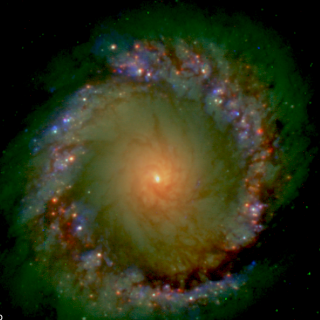Bibcode
Mack, K.-H.; Prieto, M. A.; Brunetti, G.; Orienti, M.
Referencia bibliográfica
Monthly Notices of the Royal Astronomical Society, Volume 392, Issue 2, pp. 705-717.
Fecha de publicación:
1
2009
Número de citas
23
Número de citas referidas
21
Descripción
We present new high spatial resolution Very Large Telescope (VLT) and
Very Large Array (VLA) observations of a sample of nine low-power
(P1.4GHz <= 1025 WHz-1) radio
hotspots. Infrared/optical emission is definitely detected in four of
the nine observed objects, resulting in a detection rate of at least 45
per cent. This emission is interpreted as synchrotron radiation from the
electrons accelerated in the hotspots. The integrated spectra of these
hotspots reveal typical break frequencies between 105 and
106 GHz, two orders of magnitude higher than typically found
in high-power hotspots. This supports the idea that in low-power
hotspots with their relatively low magnetic field strengths, electrons
emit most of their energy at higher frequencies. A simple spectral
ageing analysis would imply that the emitting electrons have been
injected into the hotspot volume less than ~103 years ago. We
discuss possible scenarios to explain the lack of older electrons in the
hotspot region. In particular, the extended morphology of the
near-infrared/optical emission would suggest that efficient
re-acceleration mechanisms rejuvenate the electron populations.
Proyectos relacionados

Centros de Galaxias a Escalas de Parsecs y Técnicas de Alta Resolución Espacial
Proyecto enfocado al estudio en el IR del núcleo de las galaxias más cercanas con resoluciones espaciales en el rango de 1 a 10 pc. Estas resoluciones espaciales, accesibles con los grandes telescopios de tierra usando técnicas frontera de observación, son por primera vez comparables a las que se obtienen rutinariamente con HST en el óptico y VLBI
Almudena
Prieto Escudero

Centros de Galaxias a Escalas de Parsecs y Técnicas de Alta Resolución Espacial
Proyecto enfocado al estudio en el IR del núcleo de las galaxias más cercanas con resoluciones espaciales en el rango de 1 a 10 pc. Estas resoluciones espaciales, accesibles con los grandes telescopios de tierra usando técnicas frontera de observación, son por primera vez comparables a las que se obtienen rutinariamente con HST en el óptico y VLBI
Almudena
Prieto Escudero